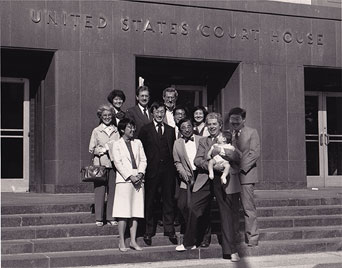
Contact us
Fred T. Korematsu Center for Law and Equality
901 12th Avenue
Sullivan Hall 313
Seattle, WA 98122-1090
Phone: 206-398-4394
Fax: 206-398-4077
Please note: The Korematsu Center will conclude its tenure at Seattle University in June 2024. We are in the process of building a new center for civil rights that will continue this important work. To learn more about those plans and ways that you can support them, please contact Assistant Dean for Development and Alumni Affairs Feven Teklu at fteklu@seattleu.edu.
The Fred T. Korematsu Center for Law and Equality hosted a major conference Feb. 11, 2012, to commemorate the 25th anniversary of the Ninth Circuit opinion in the Hirabayashi v. United States coram nobis case.
The conference celebrated Mr. Hirabayashi's courage in resisting military orders that imposed curfews on Japanese Americans and ordered them to report for incarceration; reflect on his 1943 Supreme Court case that upheld his convictions and the extraordinary work of his legal team in reopening of his case nearly 40 years later; and use his case as a springboard to move forward in the struggle for civil rights.
Please visit the Korematsu Center for Law and Equality for further information.
-
Program Brochure
-
The complete brochure content distributed during the conference is now available, or view the front cover.
-
Program Schedule
-
The 25th Anniversary of the United States v. Hirabayashi Coram Nobis Case: Its Meaning Then and Its Relevance Now
Draft as of December 1, 2011
February 11, 2012 Campion Ballroom, Seattle University
8:30-9:00 a.m. Continental breakfast
9:00-9:10 a.m. Welcome remarks
Mark Niles, Dean
Seattle University School of Law
Professor Robert S. Chang, Executive Director
Korematsu Center for Law and Equality9:10-9:20 a.m. Gordon Hirabayashi and the Incarceration of Japanese American During World War II
Tom Ikeda, Densho: The Japanese American Legacy Project9:20-9:30 a.m. Hirabayashi v. United States: 1943 and 1987
Peter Irons, Emeritus Professor of Political Science
University of California, San Diego9:30-10:45 a.m. The Reopening of Hirabayashi v. United States:
Reflections by the Team
Moderator: Rod Kawakami
Kathryn Bannai
Michael Leong
Roger Shimizu
Camden Hall
Karen Narasaki10:45-11:00 a.m. Break
11:00 a.m.-noon Introduction of Judge Mary Schroeder
Honorable Richard Jones, Federal District Court for
the Western District of Washington
What Gordon Hirabayashi Taught me About Courage
The Honorable Mary Schroeder, Ninth Circuit Court of
Appeals and author of the court's opinion in
Hirabayashi v. United States, 828 F2d 591 (9th Cir. 1987)noon - 12:30 Lunch buffet
12:30-1:15 p.m. Lunch and Program
Professor Lori Bannai, Director
Korematsu Center for Law and Equality
Lori Matsukawa
King5 News, Seattle, Washington
A message from Gordon Hirabayashi's family
Jay Hirabayashi1:15-2:30 p.m. A View from the Academy on the Significance and Present Relevance
of Hirabayashi v. United States
Moderator: Natasha Martin, Associate Dean for Research
and Faculty Development, SU School of Law
Professor Lane Hirabayashi, Asian American Studies
University of California, Los Angeles
Professor Natsu Taylor Saito
Georgia State University College of Law
Professor Eric Yamamoto
University of Hawai'i William S. Richardson School of Law
Professor Michael McCann, Political Science
University of Washington2:30-2:45 p.m. Break
2:45-4:00 p.m. The Role of the Lawyer in Public Interest Movements
Moderator: Anjana Malhotra
Korematsu Center Clinical Teaching Fellow
Seattle University School of Law
Angelica Chazaro
Northwest Immigrant Rights Project, Seattle
David Carlson, Associate Director
Legal Advocacy for Disability Rights Washington
Anne Lee, Executive Director
Team Child
Jose Padilla, Executive Director
California Rural Legal Assistance4:15-5:30 p.m. A Reception Celebrating the 25th Anniversary of the
Hirabayashi Coram Nobis Case
2nd Floor Gallery, Seattle University School of Law
Rod Kawakami, Co-Lead Counsel
Hirabayashi v. U.S. coram nobis case
Don Tamaki, Korematsu v. U.S.coram nobis case
Peggy Nagae, Yasui v. U.S. coram nobis caseOpening of Exhibit on Mr. Hirabayashi's life and cases
Law Library, 2nd Floor, Sullivan Hall -
About Gordon Hirabayashi
-
During World War II, Gordon Hirabayashi was a 24-year-old senior at the University of Washington - an American citizen by birth - when, as acts of civil disobedience, he defied a curfew imposed on persons of Japanese ancestry and refused to comply with military orders forcing Japanese Americans to leave the West Coast into concentration camps. He appealed his convictions to the U.S. Supreme Court, which, in one of the most infamous cases in American history, held that the curfew order was justified by military necessity and was, therefore, constitutional. A year and a half later, in Korematsu v. United States, the Court relied wholly on its decision in Hirabayashi to uphold the constitutionality of the mass removal of Japanese Americans.
Forty years later, in 1983, represented by a remarkable and dedicated team of lawyers, Mr. Hirabayashi reopened his case, filing a petition for writ of error coram nobis in Seattle, Washington, seeking vacation of his wartime convictions on the ground that the government, during World War II, had suppressed, altered, and destroyed material evidence relevant to the issue of military necessity. In 1986, the Ninth Circuit, in an opinion authored by Judge Mary Schroeder, vacated both Mr. Hirabayashi's curfew and exclusion convictions on proof of the allegations of governmental misconduct.
Hirabayashi v. United States, 828 F.2d 591 (9th Cir. 1987).
Members of the Hirabayashi Team and Friends
Back row: Sharon Sakamoto, Camden Hall, Peter Irons; 2nd row: Aiko Herzig-Yoshinaga, Rod Kawakami, Michael Leong, Kathryn Bannai; Front row: Karen Kai, Rod Kawakami, Gordon Hirabayashi, Jack Herzig (holding Jared Nagae), Roger Shimizu
Photo courtesy of Stan Shikuma -
Event Sponsors
-
We wish to thank the following individuals, institutions, and firms that agreed to co-sponsor this event:
Platinum Level Sponsors:
Seattle University School of Law
Asian Bar Association of Washington
Professor Lane R. Hirabayashi, George & Sakaye Aratani Professor and Endowed Chair, Asian American
Studies Center, UCLA
University of Washington School of LawSilver Level Sponsors:
Minami Tamaki LLP
Keller Rohrback LLP
Ellis, Li & McKinstry PLLC
Graham & Dunn PC
Esther Hirabayashi Furugori
Bronze Level Sponsors:
Union Bank
Sakamoto & Hamamoto LLP